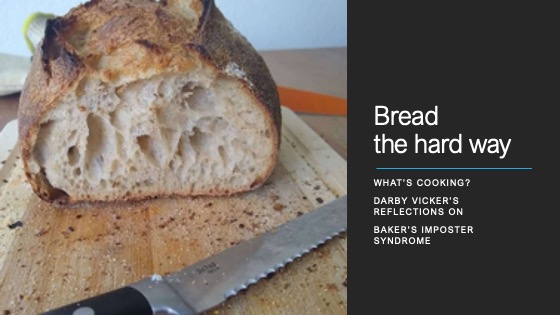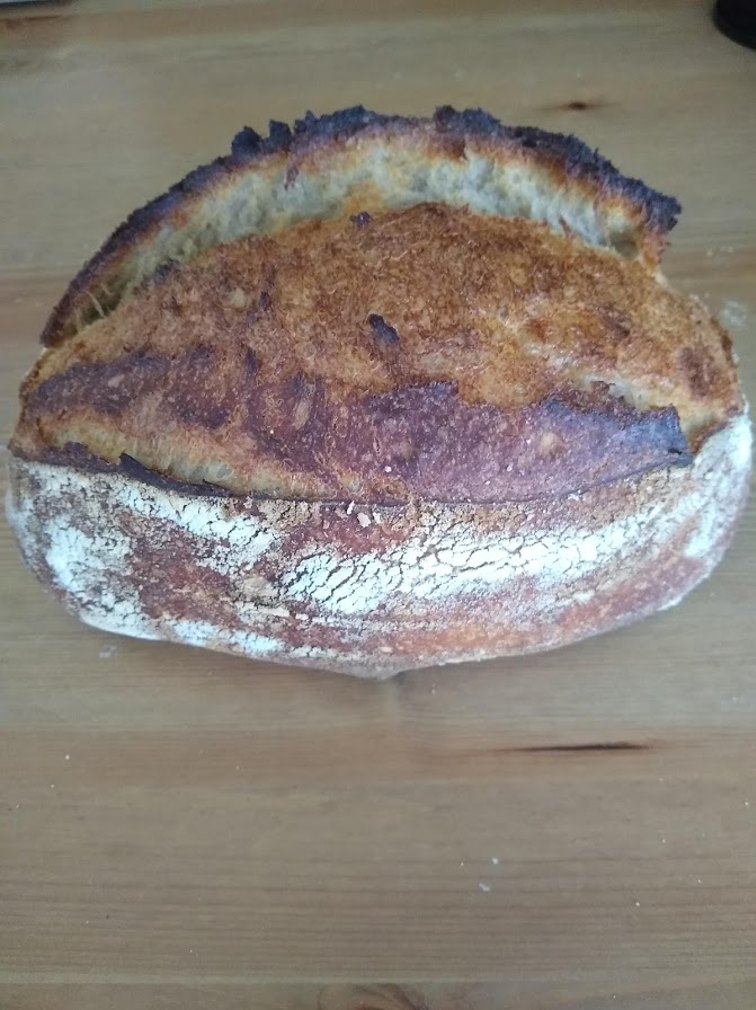
What's Cooking? Homemade bread - the hard way
Philosophy doctoral student Darby Vickers shares her experience with Baker's imposter syndrome.
Image: April 2020 loaf of the same crusty sourdough recipe Darby made in 2011-2020
What I was experiencing as the pandemic started is something that I term “baker’s impostor syndrome.” Impostor syndrome is a state in which one doubts or dismisses one’s accomplishments and experiences persistent worries that one will be exposed as a fraud. As graduate students, most of us experience impostor syndrome about our academic work. It often manifests as an underlying worry that we do not know, read as much, write as well, or produce the quality of work that we should. Not only that, but we feel that someday someone will find out. Since I switched disciplines mid-graduate school, I perpetually experience the worry that I am perhaps irredeemably unqualified to be in my chosen field. And this worry comes coupled with the fear that someone will find out that I don’t belong and take away my dreams. I never expected that I would feel the same way about bread baking.
Between 2009-2013, I baked bread at least once a week, and some of that bread was truly spectacular. At first, I baked bread to manage my time while writing my undergraduate thesis. I would read and do research in the morning, and then write in the afternoon in between the various stages of breadmaking. My breadmaking became so integral to my academic performance that, at commencement, I handed the college president a loaf of fresh bread, when he handed me my diploma. After college, I moved back in with my family in southern California, and my bread obsession really took shape. At first, it was challenging to make bread in the San Fernando Valley - the oven vented steam and the Portland-grown sourdough starter didn’t like the dry heat. I taught myself how to make bread from blogs, but blogs couldn’t help me troubleshoot the problems I was having. With my mom’s help, I searched for books on bread making. Once I had learned about some of the principles that govern bread making, I realized why my bread had worked-- almost by pure luck-- in Portland and how I could develop techniques that would allow me to make even better bread. By 2011, I was making rustic sourdough batards with crunchy crusts and a creamy, pearlized interior of lacy gluten strands and large irregular holes. Friends started asking for lessons, and I ran a few informal workshops.
When I entered graduate school, everything changed. My oven was difficult and finicky. I was working frantically during the week, writing papers and keeping up with my seminars, and I spent many weekends out of town. Worst of all, I accidentally killed my sourdough starter. When I started over, it took weeks before my starter seemed strong enough to raise anything and when it did seem strong enough, it had a distinct smell similar to soy sauce that had spent too much time under the sun. I used a process called “washing” a starter and it began to smell better. I made some loaves, some English muffins, and lots of waffles. The bread was fine, but it didn’t synergize with my schedule in the same way. I was afraid that the imperfections in my bread meant that I wasn’t a good baker. After a few failed loaves, I gave up and froze my starter.

(Caption: Sourdough English muffins baked in April 2020 in the same style as my 2013-2014 English muffins)
On March 20th, 2020, I received my first call in years asking for bread advice. As much as I tried to be helpful, my heart couldn’t help but sink the longer the conversation continued. Once I saw the empty shelves of bread and flour in the grocery stores, I knew the calls would continue throughout the pandemic. I had not only shared my bread, but I had also run workshops teaching friends how to make bread. The problem was, I no longer felt qualified to give advice about baking. I wanted to start again, but I was afraid that I would fail.
A few days later, I confessed my fears to my partner. He paused, smiled, and then told me exactly what I needed to hear. The essence of his advice was: Baking is a skill like any other. If you stop for a while, the skill atrophies. Mistakes, failures and imperfections provide a roadmap for improvement. In order to reclaim a skill, you need focused practice in which you systematically observe and improve.
This advice isn’t only true for bread baking -- it’s true for any skill you might acquire. Lots of us, stuck in our homes, are returning to old hobbies and tasks. Chances are, those skills aren’t going to come back overnight. They will require practice and effort. However, you may even end up a more skilled practitioner by the end of quarantine than you were before!
After this cathartic conversation, my first few loaves were so-so, but over the last few weeks, I’ve pulled some incredible bread out of my oven. I’m still inconsistent, and I’m still learning how to work with the temperamental sourdough starter I made back in my first year of graduate school, but I no longer feel like a fraud. My next step will be to conquer my bread anxiety (the anxiety that comes from waiting for the bread to rise, so you can see whether the choices you made during your previous step worked).

(Caption: the exterior of the sourdough loaf shown above)
